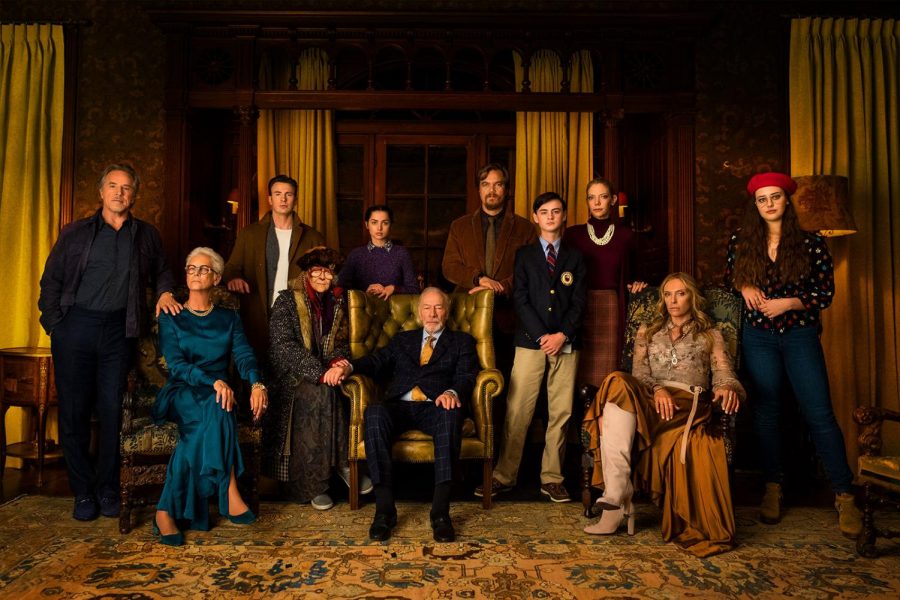Knives Out: The slash of white privilege
Although we’ve just entered a new decade, something that has followed through into the New Year is the lasting impression of an excellent movie. Knives Out, released November 27th, 2019, has irrefutably earned and even surpassed this classification, receiving three Golden Globe Nominations, three Critics’ Choice Awards Nominations, a 97 percent on Rotten Tomatoes, and a box office profit of nearly 200 million dollars.
Produced by Rian Johnson, Knives Out is a unique take on your typical murder mystery movie. After the unexpected death of esteemed and wealthy crime novelist Harlan Thrombey on his 85th birthday, his chaotic family reunites to mourn his loss. What appears to most as a death fueled by natural causes is instead an area of investigation for detective Benoit Blanc (Daniel Craig).
Although Harlan’s family initially appears to be distraught over his death during the first police questioning, in only the first few minutes of the movie, the many red flags surrounding Harlan’s death are humorously introduced. Nearly everyone is revealed to have a motive, setting up the movie to be anticipatingly convoluted with possibilities. While detective Blanc works his way through the family’s little white lies, the not-so deceiving Thrombeys are solely focused on inheriting Harlan’s generous legacy.
“The first scene does a great job of establishing how campy Thrombey family truly is,” claims Hills junior Claudia Kim. “You have these really cutthroat, obnoxiously rich people feigning remorse over Harlan’s death as if it isn’t obvious from the get go what their what their intentions are.”
The overarching theme that explains the family’s absurdity is the concept of white privilege. The social commentary surrounding the family’s white privilege is gradually integrated into the film; it’s subtle at first, then becomes the focal point of the plot with both humorous and serious undertones. It is established through the family’s interactions with Harlan’s Hispanic caretaker Marta Cabrerra (Ana de Armas).
This theme is first introduced when two of the family members are arguing about the current American immigration system. While Walt Thrombey (Harlan’s son) emphasizes that immigrants are entering illegally to steal American jobs, Joni Thrombey (Harlan’s in-law) argues that they’re simply seeking a better life. Walt, incorrectly, uses Marta as an example of a “good” immigrant, highlighting how she entered the country legally and is here with good intentions. The catch is, her mother, sister, and herself are all illegal immigrants. How’s that for irony?
This scene magnificently portrays a common misconception in the immigration argument, which is the connotation behind illegal and legal immigrants. To some, an illegal entrance equates to having malicious intent, while a legal entrance equates to being morally correct and deserving of opportunity; this is a toxic generalization. In truth, a person who is entering the United States with the intention of working hard and improving their life is a good person, regardless of how they may have entered. Immigrants are just as hardworking and driven as citizens, if not more.
I asked Hills student Yemie Woo her take on Johnson’s immigration perspective. “This commentary is not about convincing viewers that each and every immigrant has good intentions –– there are always going to be bad people. The need for this commentary stems from the ignorant argument that all illegal immigrants are bad and that, because of this, none of them should be given a chance.”
“It’s an argument that people may think doesn’t belong in a murder mystery movie,” Woo continues, “but it’s a relevant and necessary argument that needs to be had. America is called ‘the melting pot’ for a reason, and we can’t denounce this title now.”
The concept of white privilege intensifies during the brief reading of Harlan’s will, in which Marta goes from from an admired honorary member of the Thrombey family to their main enemy when she is announced to be the sole inheritor of Harlan’s fortune. This makes sense to the average viewer, as she was the only person who truly cared for Harlan both physically as his caretaker and emotionally as his friend, but it sure doesn’t add up to the dense Thrombeys.
Spewing expletives at Marta and even going so far as to call her an “Anchor baby” as she rushes out of the house, the Thrombeys are livid with the outcome. Marta, after taking some time to herself, decides that it’s only fair that she splits the fortune with his family to appease their sickening greed for money and status. In the end, Marta––the illegal immigrant––is the only morally just “member” of the Thrombey family.
Now, to make the claim that immigrants are actually respectable people, although accurate, is not necessarily a radical or significantly bold statement. In fact, to have Marta endure disrespect from these entitled tyrants with no so much as a complaint would just establish immigrants as pushovers who feel the need to kiss the ground the privileged whites walk on in order to simply survive.
As said by Hills junior Isabella Sanar, “Immigrants shouldn’t come here to live in fear and walk on ice. They came here for a better life, and that’s exactly what they should aim to obtain.”
Ana de Armas would in fact agree with myself and Sanar. In her interview with The Hollywood Reporter, de Armas reveals that she “originally passed on the audition due to an underwritten character description that labeled Marta as a ‘pretty Latina caretaker.’”
“Getting an email that described the character like that — without any more information or a script attached because it was high-profile and secret — just really didn’t speak to me,” de Armas continued, “so, because of the character description, my imagination immediately went to a portrayal that was not necessarily very positive or exciting in relation to Latin culture. So, when I finally read the script, I realized that the description didn’t fit at all because Marta is so much more than that.”
The script including that, at the end of the movie, Marta looks down onto the Thrombeys from Harlan’s grand balcony while sipping a coffee cup that reads, “My House, My Rules.” In the end, Marta decides against giving even a penny to the family who has been nothing but awful to her. With a dramatic and satisfying change in power dynamic, Rian Johnson succeeds in demolishing white privilege while painting the image of a resilient, empowered Latina immigrant.
It isn’t often that you see this dynamic in Hollywood. I have to admit, when Marta was first introduced as the caretaker, I got major “Consuela from Family Guy” or “Devious Maids” vibes, but I was pleased to see that this wasn’t the case. The main stereotypes of Latinas as either sleazy playthings or maids has grown extremely insufferable and consistently missed the mark in being funny, especially in my perspective as a Latina. “Humor” isn’t putting a Spanish-speaking woman into a predominantly English show and using as comedic relief.
“I was really happy with the ending of the movie,” says Hills senior Aly Cohen, “and the fact that Rian Johnson made Marta so much more than just a maid. I’m sure she serves as a figure of inspiration for Latina women out there.”
All in all, Knives Out has the ability to permanently disrupt the stereotypes of Latinas in film and television with its excellent plot and the liberties taken within it.













































